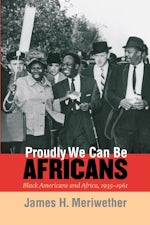Afropolitan Projects
Redefining Blackness, Sexualities, and Culture from Houston to Accra
By Anima Adjepong
216 pp., 6.125 x 9.25, 3 halftones
-
Paperback ISBN: 978-1-4696-6519-1
Published: November 2021 -
Hardcover ISBN: 978-1-4696-6518-4
Published: November 2021 -
E-book EPUB ISBN: 978-1-4696-6520-7
Published: October 2021 -
E-book PDF ISBN: 979-8-8908-6088-0
Published: October 2021
Buy this Book
- Paperback $29.95
- Hardcover $95.00
- E-Book $24.99
For Professors:
Free E-Exam Copies
About the Author
Anima Adjepong is assistant professor of women's, gender, and sexuality studies at the University of Cincinnati.
For more information about Anima Adjepong, visit
the
Author
Page.
Reviews
"Recommended [for] general readers, advanced undergraduates through faculty, and professionals."—CHOICE
"The increased mobility and interconnectedness of Africans and Diasporans begs greater analysis, and Anima Adjepong's in-depth scholarship captures the nuance and the complexity in the internal and external relationships Afropolitans have with host and home cultures and communities."--Msia Kibona Clark, Howard University
"Written in beautiful narrative prose, this book brilliantly uses rich and captivating metaphors (e.g., Wakanda and wahala) to discuss the paradoxes of nation-making, space-making, and identity discourses in transnational postcolonial sites. Within an expansive queer methodology, including stories, art, and participant observation, the book uses excellent sociological analysis to historicize and problematize the mundane everydayness of Afropolitan worlds in ways that highlight ongoing erasures (intentional or otherwise) of the wahala non-Afropolitan others in this Wakandan era of Africa Rising."--Sylvia Bawa, York University
"With a keen eye for detail and cogent multilayered analysis, Dr. Adjepong expertly weaves together a focus on class, religion, gender, sexuality, race, and nation at the transnational crossways linking Accra and Houston. Afropolitan Projects critically interrogates both the promises and pitfalls produced on the ground through the contours of lived experiences and vibrant forms of material culture alongside the structural realities and political possibilities they engender. This book has much to offer in rethinking analytics of diaspora, postcoloniality, and belonging in Africa and the world."--Kemi Balogun, University of Oregon



